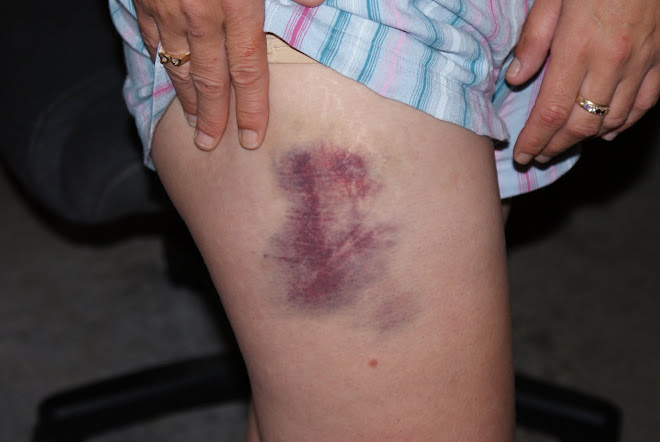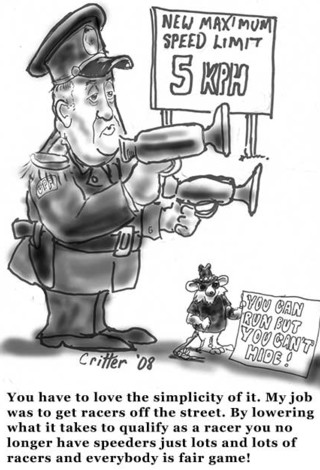Source: CBC.CABy any measure, Gary McHale and Mark Vandermaas are pains in the butt.
The two activists descended upon the Caledonia, Ont., standoff in 2006, claiming they were standing up for equal rights.
The pair felt the Ontario Provincial Police was not being fair to local residents in the dispute, favouring instead those of First Nations descent because of the OPP's sorry record in the similar Ipperwash confrontation in 1995.
Their suspicions were returned in kind: Both the cops and the Six Nations people believed McHale and Vandermaas were agitators bent on encouraging unrest.
Some even went so far as to accuse the pair of being white supremacists who didn't like the province's handling of the native demands.
But anyone who believes in justice being open and transparent might just consider them heroes with what they've accomplished so far in Ontario courts.
Where the police have turned a blind eye, they have shone a spotlight and laid private charges, with astonishing success.
To date, they have won four cases in Superior Court and now — against serious odds — have succeeded in laying criminal charges against OPP Commissioner Julian Fantino, the province's top cop, for influencing or attempting to influence municipal officials.
For his part, the OPP chief has played down the charge, in fact he once called McHale "a goof" who he would gladly have arrested himself.
But Fantino is now scheduled to have his day in court — on the defendant's side of the table — and, if the trial goes ahead, it could well have important consequences for those in positions of authority.
Common law
McHale and Vandermaas, who have no legal backgrounds, are using orders of mandamus, an ancient legal writ that commands the legal system to perform its functions.
"In our system, prior to 1858, there was no such thing as a Crown attorney," said McHale, the more public face of the pair.
"But those common law rights are still there. We have a lot more power as citizens, but we don't prosecute our government officials when they screw up."
If the government or the police fail you, McHale says, you should take them to court.
"That's what we needed in the sponsorship scandal.
"Someone in the public should have laid charges against the politicians instead of spending a $100 million on the Gomery inquiry."
Mischief-maker
McHale, 47, claims he was minding his own business when he was drawn to the Caledonia fight in the summer of 2006.
A computer programmer who specializes in accounting software, he was known as an inveterate writer of letters to newspapers and as someone with an admittedly right-wing bent.
Read a history of the complaint against OPP Chief Julian Fantino and his response.
View commentator Rex Murphy's take on the dispute.
In 2001, he was charged with mischief and even spent a night behind bars for tying up Liberal MP Bryon Wilfert's fax machine with repeated requests that he answer his questions.
Holding people accountable is McHale's raison d'etre. He did not get involved in Caledonia until the repeated clashes over the disputed land escalated into violence and, in the view of many people there, the police failed to intervene.
In the summer of 2006, McHale began to chart all the incidents where no charges were laid, and put videos of some of them on his website.
He started a petition for the removal of OPP Commissioner Gwen Boniface (who would leave before summer's end). And he instructed local residents to make sure they received an incident number from police when they phoned in to report something wrong.
That was because he felt the police had been negligent in not only investigating but recording crimes.
At one point, giving a speech in Brantford in October 2006, McHale was videotaped by Mark Vandermaas, a former UN peacekeeper from London, Ont., who put the video on his website Voice of Canada and their collaboration began.
Raising a flag
"When they came to town, I saw them as true leaders," said Caldeonia resident Merlyn Kinrade, 75, a retired plumber. "They were true Canadians in every sense of the word.
The two men encouraged their followers to shun violence, and their main act of defiance was to raise the Canadian flag, which led to their initial confrontation with the police.
It irked Vandermaas that it was so outrageous to raise the flag on Canadian soil.
"Their reason for stopping us was to protect us from harm from an extreme element which might want to hurt us," said Vandermaas. "So they were arresting the potential victim.
Where's the logic in that?"
Shortly after Fantino, the tough-talking former head of the Toronto Police Service, was appointed OPP commissioner on Oct. 30, 2006, he openly criticized McHale and his supporters, calling them "goofs" and "troublemakers" bent on creating "civil war."
The following April, when a Caledonia town councillor, Craig Grice, said something positive about McHale, Fantino jumped down the throats of the Caledonia council.
He emailed them, saying the OPP "have worked tirelessly on the front lines and beyond to simply maintain order in an otherwise chaotic and very turbulent situation; made especially difficult every time McHale and his followers come to town."
Fantino then vowed to hold Haldimand County and McHale responsible for any injuries suffered by an OPP officer, and said he would recommend pulling police out of the county in 2008 when their contract comes up for renewal.
"When I appeared before you several months back, I came away believing we had a mutual understanding about the detrimental effect that McHale and his followers were having in Caledonia," Fantino wrote the council.
"We never expected that [Grice] would fall prey to McHale's propaganda and it is now up to you as a council to deal with the fallout."
A direct attack
Vandermaas felt the email revealed the commissioner "as a bully. We considered it a direct attack on democracy."
The commissioner's insistence on painting him and McHale as outsiders coming to town, says Vandermaas, was no different than what Martin Luther King Jr. faced when he led his protests for equal rights from a Birmingham jail.
Vandermaas also feels that the centuries of injustice felt by Canada's Aboriginal Peoples cannot be remedied by treating them differently under the law.
"The way to solve racism is not to create unequal treatments of people based on their skin colour. I want the OPP to be colour-blind and blind to that person's race," he says. "Justice must be blind."
With others, the pair created a new website, CANACE-Canadian Advocates for Charter Equality, to further articulate their cause.
What happened next, though, would change McHale and Vandermaas from webmasters into a new career as amateur lawyers.
Charges stayed
Over the next two years the two men — with help from fellow CANACE founder Jeff Parkinson — launched 20 legal actions. Some were directed at two key native protesters, whom McHale blames for having shut down most of the development in Haldimand County.
The OPP then laid their own charges against the two native men after McHale's were certified by the court. But the Crown stayed those charges.
McHale also had native leader Clyde Powless charged with assaulting a police officer, obstructing police, being a member of a riot and assault causing bodily harm, but the Crown stayed those charges, too.
Undaunted, McHale is asking for judicial reviews of the stays by a divisional court, where three Superior Court judges will have to determine whether the Crown is abusing its authority.
"You have not lived until you see a guy like Gary in running shoes, take on three of the best lawyers taxpayers can buy and succeed five times," says Vandermaas. "The government is no longer accusing us of abusing the courts."
Common nuisance
McHale has also attempted to lay charges against police officers and government officials for common nuisance (for not carrying out their duties). As well, he laid mischief charges against police officers who allegedly helped natives construct a barricade.
"The two fundamental battles we're fighting for are the rights of a citizen to lay a charge if they have the evidence," said McHale. "And establishing that government officials and police officers are equal under the Criminal Code."
However, McHale is also being sued by OPP officers for $7.2 million for defaming them on his website.
As well, in December 2007, the OPP charged him with counselling mischief, not committed for his role in organizing a protest against the ongoing standoff in a farmer's field near Caledonia.
It was an obscure charge used by police who were bent on having him banned from Caledonia.
Ironically, it is that charge that has led to McHale's legal victories.
"I couldn't travel to Caledonia any more, so it freed up a lot of time to focus on court," said McHale. "The charges gave me the right to disclosure.
"The Crown said I was asking for way too much, but I'm now at volume 24 and most of the good stuff came after the government said I had enough disclosure."
Demand your rights
Abandoning their regular jobs, and living on whatever could be fundraised at the local Tim Hortons, McHale and Vandermaas started finding out more about their legal rights.
The key, McHale says, is "to get documents, use police service complaints, videotape everything, track as many government documents as you can and, at least in this case, monitor what government lawyers are saying in other courtrooms.
"They don't keep their stories straight," said McHale. "Transcripts from one courtroom are being used against them in another. That crucifies them all the time."
His four major victories in Superior Court are all related to private prosecutions and include the right of citizens to petition for a writ of mandamus (literally an order from a higher court to an inferior court or a public official); and to get mandamuses heard in open court, including Superior Court, so the media can report on all the relevant facts, excluding the names of the potentially accused.
In one of the decisions, the late Justice David Marshall, citing American Founding Father Alexander Hamilton, called private prosecutions a "bulwark of democracy."
Asked what he has learned since his days writing letters to the editor, McHale said it is that Canadian legal rights exist but they are not easily granted to you-you must demand them.
"It's up to the individual to say: 'My rights are violated. I have to go to court.'"
Going to court has been costly-both McHale and Vandermaas are about $50,000 in debt-and it has been time-consuming.
"If you're going to fight a battle," says McHale, "resolve yourself that it is long term. There's no one protest, no one letter, no one politician to take your side. You're in for the long haul and for the ups and downs.
"One day they're patting you on the back, the next day they're cursing your name. You've got to keep going."
Read more: http://www.cbc.ca/canada/story/2010/02/02/f-caledonia-fantino.html#ixzz0eTMtfKmR
Wednesday, February 3, 2010
Subscribe to:
Post Comments (Atom)
They had No Choice!

They wore these or I took away thier toys for 7 days!
"Damn Street Racer"pays with Brusies


















No comments:
Post a Comment